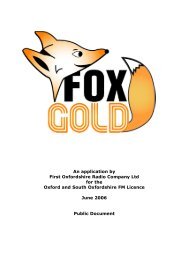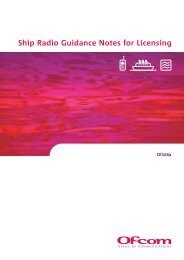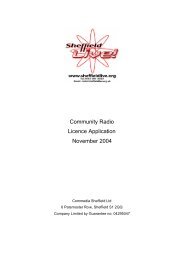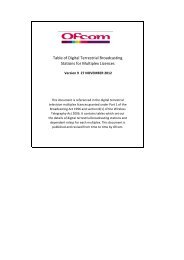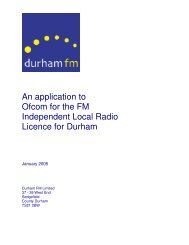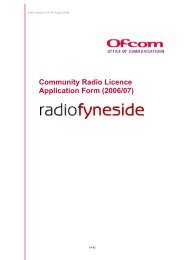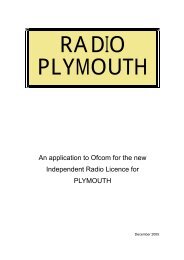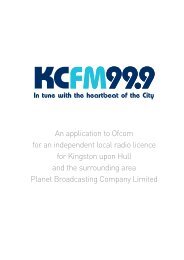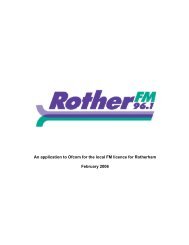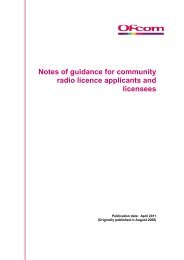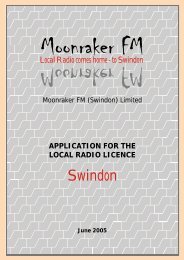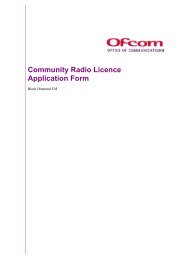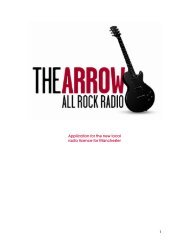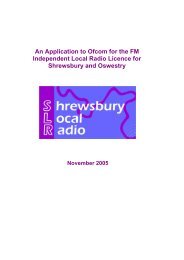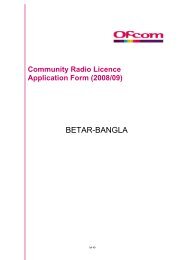Community radio licence application form TD1 ... - Ofcom Licensing
Community radio licence application form TD1 ... - Ofcom Licensing
Community radio licence application form TD1 ... - Ofcom Licensing
You also want an ePaper? Increase the reach of your titles
YUMPU automatically turns print PDFs into web optimized ePapers that Google loves.
<strong>TD1</strong> Radio <strong>application</strong> <strong>form</strong><br />
Social gain<br />
5. Social gain Guidance Notes<br />
<strong>Community</strong> <strong>radio</strong> is required to be for the public good<br />
and to bring community benefits, or social gains, to<br />
listeners and participants. The requirement for „social<br />
gain,‟ is one of the key factors that makes community<br />
<strong>radio</strong> stations different from other <strong>radio</strong> services.<br />
Please tell us what community benefits your service<br />
will bring to your target community(ies) and/or the<br />
general public. Please include summaries of<br />
evidence to support your answer.<br />
Your draft „key commitments‟ (later in this <strong>form</strong>)<br />
should include a summary of your proposed social<br />
gain set out below.<br />
Answer in fewer than 1,500 words:<br />
5<br />
Broadcasting legislation specifies a number of<br />
‘characteristics of community <strong>radio</strong> services’. Licence<br />
holders need to ensure their services con<strong>form</strong> to these<br />
characteristics, including in this case the delivery of<br />
social gain.<br />
The legislation sets out social gains that stations must<br />
provide. These are the achievement, in respect of<br />
individuals or groups of individuals in the target<br />
community, or in respect of other members of the public,<br />
of the following objectives –<br />
(a) the provision of a <strong>radio</strong> service to individuals who<br />
are otherwise underserved by such services,<br />
(b) the facilitation of discussion and the expression of<br />
opinion,<br />
c) the provision (whether by means of programmes<br />
included in the service or otherwise) of education or<br />
training to individuals not employed by the station,<br />
and<br />
(d) the better understanding of the particular community<br />
and the strengthening of links within it.<br />
Social gain may also include the achievement of other<br />
objectives of a social nature. 1<br />
Applicants are required to provide evidence that their<br />
service will result in significant social gain to the public<br />
or the target community(ies). Copies of letters or<br />
research reports etc. should not be submitted, but brief<br />
relevant extracts from them, which represent an<br />
accurate and comprehensive summary, may be<br />
included. If we wish to see the source material, we will<br />
ask for it.<br />
<strong>Ofcom</strong> is required to have regard to the extent to which<br />
your proposed service would result in the delivery of<br />
social gain to the public or target community.<br />
(a) the provision of a <strong>radio</strong> service to individuals who are otherwise underserved by such services<br />
<strong>TD1</strong> Radio will focus on under-served target audiences; defined using a wide range of demographic data and<br />
other in<strong>form</strong>ation to ensure our programming meets their specific needs. We will deliver very local and niche<br />
programmes which will be of interest to retired people, the unemployed, youths, students, single parents and<br />
minority groups.<br />
We will cover local events such as carnivals, music festivals, open days, educational activities, some sporting<br />
events, and will encourage local groups to get involved, make their own programming and be interviewed about<br />
their activities and work that they do. We expect to continue to work with a number of community groups such as<br />
BAAGS, Rowan Boland Trust, Borders Barmy Army, Borders Animal Welfare, Callum‟s Trust, Walkabout Crafts,<br />
Volunteer Centre Borders and the Borders Adult Learning & Achievement Group, to name just a few.<br />
We already have (and will continue to) be committed to having an equal rights opportunity policy, which has been<br />
recognised by Volunteer Development Scotland. They are now using <strong>TD1</strong> Radio as a case study to be offered<br />
out to other Voluntary groups in Scotland as evidence of our good practice. Our innovative work has ensured that<br />
one of our presenters with a deteriorating eye condition is still able to present her programme and is clear<br />
evidence of our equal opportunities policy.<br />
1 See Article 2(3) of the <strong>Community</strong> Radio Order 2004 and <strong>Ofcom</strong>‟s Notes of guidance for community <strong>radio</strong><br />
applicants and licensees.



